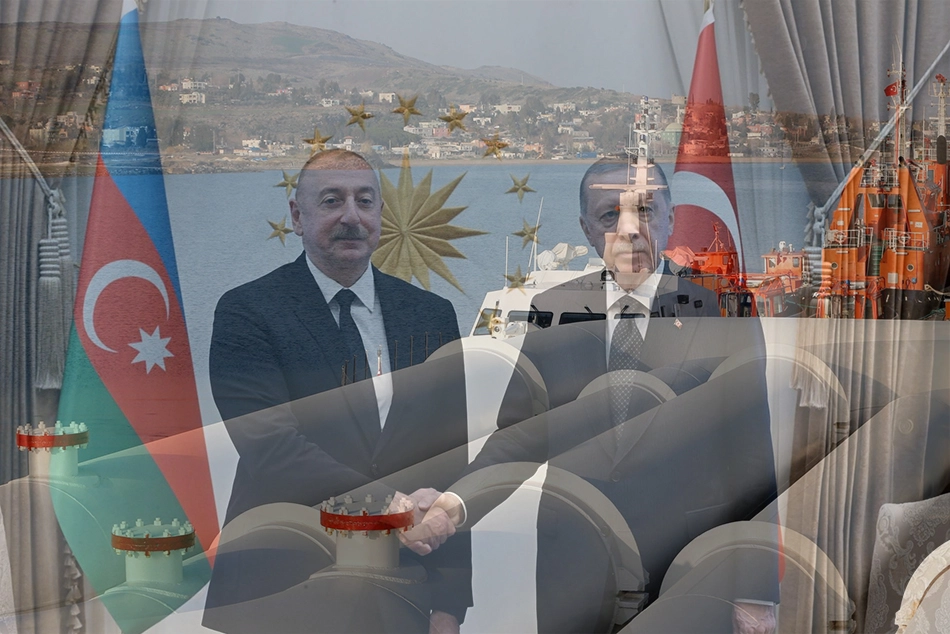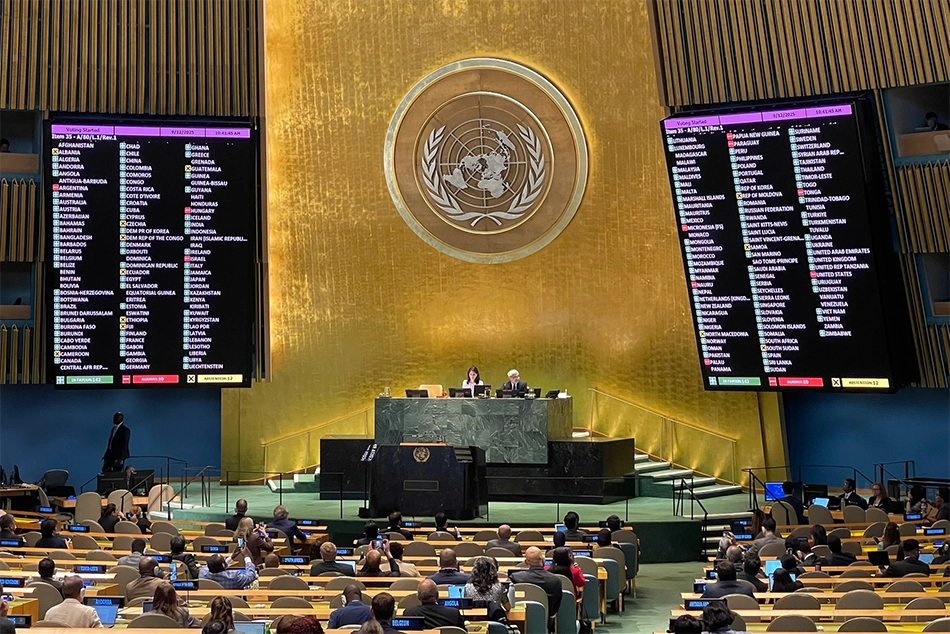
Migration of The Prophet's Companions to Abyssinia
During this extremely difficult and distressing time, the Prophet Muhammad (saws) advised his persecuted and helpless companions (ra) to migrate to Abyssinia (Habsha–Ethiopia)

Opening Words
"Hijrah" is a word of Arabic language and literature. Its literal meaning is "to leave one country and move to another." In Islamic terminology, it refers to "moving from a land of disbelief (Dār al-Kufr) to a land of Islam (Dār al-Islām)." Therefore, if this migration is made as an act of worship for the sake of Allah (swt), it is considered a Shar'i (legitimate) Hijrah. (Al-Mawsu'ah Al-Fiqhiyyah 42/189) Hijrah has been defined in several ways: e.g. when a person permanently leaves their homeland and settles in another place, it is also called Hijrah. Hijrah also means "to leave a place to seek sanctuary or freedom from persecution or freedom of religion of any other purpose." If a person migrates to save and protect his Imam and faith, he will be rewarded greatly. Allah Almighty has promised great rewards for Hijrah, as mentioned in Surah An-Nisa: 100 and Surah Al-Hajj: 58-59.
Throughout human history, many migrations have taken place. Some of these migrations occurred based on faith, belief and the establishment of religion. Among them are: Prophet Ibrahim (Aleihis Salam)’s migration from Iraq to Syria, Prophet Lut (AS) moving towards Syria, Prophet Musa (AS) traveling from Egypt to Madyan, and Prophet Muhammad (Sallallahu Aleihi Wa Sallam) leaving Makkah and settling in Madinah, severing his ties with his homeland. The migration under discussion here refers to the migration of the devoted Sahabah (companions) of Prophet Muhammad (saws) from Makkah to Abyssinia (Ethiopia). They undertook this journey to escape the persecution and oppression of the Makkah polytheists, to protect their faith and beliefs, and to attain religious freedom.
Spread of Islam and Rage of Makkans
For about four to five years, Prophet Muhammad (saws) tirelessly called people to Islam through continuous preaching and efforts. As a result, Islam began to spread gradually in the valleys of Makkah, and the number of Muslims started to grow. Some of the companions (ra) and even the Prophet (saws) himself received support and protection from their families and tribes, which made the polytheists of Makkah uneasy about their failure to suppress Islam. Realizing their inability to stop the spread of Islam, the Makkans intensified their oppression and brutality against the weaker and more vulnerable companions (ra). They tortured and persecuted them in unimaginable ways, making their lives in Makkah unbearable for them. The suffering of those noble companions (ra) only strengthened their faith rather than weakening it. To understand the severity of Quraish’s oppression, read the following text: "The Quraish tormented them in such a way that finding a parallel in the history of tyranny would be an insult to the uniqueness of their cruelty." (Seerat-un-Nabi 1/139)
Guidance for Migration to Abyssinia
During this extremely difficult and distressing time, the Prophet Muhammad (saws) advised his persecuted and helpless companions (ra) to migrate to Abyssinia (Habsha–Ethiopia). The reason was that the Prophet (saws) knew that Abyssinia’s ruler, Negus (King Ashamah), was a just and fair ruler who didn’t allow oppression in his land. The Prophet (saws) said: "If you head towards the land of Abyssinia, you will find a king there who doesn’t allow oppression upon anyone. It is a land of truthful people, (so stay there) until Allah provides a way out for you." (Seerat Ibn Hisham 1/321)
First Migration to Abyssinia
Following the guidance of Prophet Muhammad (saws), a small group of male and female companions (ra) secretly set out for Abyssinia (Habsha) in Rajab, the 5th year of Prophethood. This group was led by Sayyiduna Uthman bin Affan (ra). Some of them travelled on foot, while others rode, eventually reaching the port of Jeddah. According to Ibn Kathir, the first group of emigrants included 11 male companions (ra) and 4 female companions (ra) (Al-Seerah Al-Nabawiyyah, Ibn Kathir 2/3). Upon reaching the port, they found two trade ships ready to set sail for Abyssinia. The fare for each person was set at half a dinar (Uyoon al-Athar 1/136). However, the Quraish of Makkah got wind of their secret departure and pursued them to the port, hoping to capture and stop them. But by the time the Quraish reached, the ships had already set sail, leaving them frustrated and empty-handed.
In Abyssinia, these migrants found themselves among nice and kind neighbours. They lived there in peace, security and tranquillity, without any fear of persecution or oppression. With complete religious freedom, they were able to worship Allah and fulfill their religious duties without any hindrance. They remained in Abyssinia for about two months and a few days. (Al-Seerah Al-Halabiyyah 1/458).
Return of Migrants to Makkah
One day, Prophet Muhammad (saws) recited Surah An-Najm in the Haram Shareef (Sacred Masjid). Upon hearing the powerful verses, even the polytheists of Makkah fell into prostration. (Al-Seerah Al-Halabiyyah 1/458) When news of this event reached the Muslim migrants in Abyssinia, it was misreported to them that the Quraish of Makkah had accepted Islam and that Islam was spreading rapidly in Makkah. Believing this to be true, the migrants set out for Makkah in the month of Shawwal. However, as they approached the outskirts of Makkah, they encountered a traveller and inquired about the situation in Makkah. To their disappointment, they discovered that the news they had received was false—the Quraish hadn’t embraced Islam, and persecution of Muslims was still ongoing. This realization put the migrants in a difficult dilemma. Eventually, some of them entered Makkah under the protection of influential Quraish leaders; while others secretly slipped back into the city to avoid persecution.
When the group of migrant companions (ra) returned to Makkah, the polytheists intensified their violence and oppression against them as well as against other Muslims. The persecution and harassment by the Quraish increased day-by-day. In light of this escalating situation, Prophet Muhammad (saws) granted permission to his companions (ra) for a second migration, allowing them to seek safety and refuge.
Second Migration to Abyssinia
Compared to the first migration, the second migration was fraught with hardships and trials. This was primarily because the polytheists of Makkah were fully prepared to prevent the Muslims from migrating. However, Allah (swt) was with these sincere believers, and despite the challenges, a large group of male and female companions (ra) prepared to embark on this journey and successfully reached Abyssinia without falling into the hands of the Quraish. On this occasion, 83 male companions (ra) and 18 female companions (ra) migrated to Abyssinia (Al-Seerah Al-Halabiyyah 1/477). After arriving in Abyssinia, they engaged in the worship of Allah in peace and tranquillity, just as they had before. Once the Quraish became aware of the second migration, they were infuriated and began devising a plan to bring the migrants back to Makkah.
Envoys of Quraish and King's Reaction
The polytheists of the Quraish decided to send two exceptionally clever and astute individuals, Abdullah bin Rabi'ah and Amr Ibnul Aas, as envoys to the King of Abyssinia, Negus (Ashamah Najashi). They provided these envoys with gifts such as a horse, a robe, silk and dyed leather to present to the king and the Batriq (Christian clerics) (Al-Seerah Al-Nabawiyyah, Ibn Kathir 2/18). Upon arriving in Abyssinia, the envoys first met with the Batriq, delivering the gifts and then presenting their case. They requested the Batriq to support and endorse their plea for the return of the migrants to Makkah. The Batriq assured them that they would provide the support.
The envoys arrived at the court of the king and first presented the gifts to him. Then they addressed the king, saying: "O King! Some ignorant youths from our community are in your kingdom. They have abandoned the religion of their people and haven’t adopted your religion either; they have invented a new religion that neither we nor you know anything about. We have come here on behalf of their chiefs—parents, uncles, and relatives—to request that you send them back, for their people will take better care of them and understand the reasons for their faults and grievances." The clergy sitting around the king supported the envoys' claims, stating: "O King! They speak the truth. Their community will take better care of them and understand the reasons for their faults and grievances. Therefore, you should hand them over to these two men; they will return them to their people and their land." (Musnad Ahmad: 1740)
The king expressed his anger stating: By Allah, it is not possible for me to hand over the people, who have preferred me and chosen to seek refuge and reside in my land, without discussing the matter and investigating their circumstances. I will first ascertain the truth from them. If what the envoys say is true, I will hand them over; but if it is false, then I cannot surrender these migrants to them.
Presentation of Muslims in King's Court and his Question
The king sent his messenger to summon the migrants. When the messenger arrived, the migrants gathered together. They began to ask each other what they should say before the king. They ultimately decided that they would speak the truth, regardless of the consequences. Jafar (ra) represented the Muslims as they entered the king's court. The king then asked: "What is this religion that has caused you to abandon your people, yet you haven’t entered into my religion nor into the religion of any of the other nations?" (Ibid)
Depiction of the Age of Ignorance and Introduction to Islam
The spokesperson for the migrants, Jafar (ra), addressed the king: "O King! We were a people living in ignorance, practicing idolatry. We consumed carrion and committed immoral acts. We severed ties with our relatives and treated our neighbours poorly. The strong among us would oppress the weak. We were in such a dire situation when Allah (swt) sent us a messenger from among ourselves, whose noble lineage, truthfulness, trustworthiness and purity we already knew."
"He called us to worship Allah alone and to abandon the stones and idols that we and our forefathers used to worship. He commanded us to speak the truth, fulfill our trusts, maintain family ties, treat our neighbours well, and to avoid immorality and bloodshed. He forbade us from engaging in immorality, lying, consuming the property of orphans, and slandering chaste women. He instructed us to worship only Allah and not to associate anything with Him. He commanded us to perform Salaah, pay Zakaah and observe fasting."
Thus, he enumerated the Islamic commandments and said: 'Then we affirmed him, believed in him, and followed what he brought. Consequently, we worshiped only Allah and didn’t associate anything with Him. We regarded as forbidden what he declared forbidden to us, and we considered as permissible what he declared permissible. Then our people became our enemies. They persecuted us and subjected us to trials concerning our religion, trying to turn us back to idolatry and to deem as permissible those filthy things we once accepted. When they persisted in their oppression and became severe against us, blocking our path to our religion, we migrated to your kingdom. We preferred you over others, sought refuge with you, and, O King, we hoped that we would not be wronged in your land."
Then Najashi asked, "Do you have any of what he (Prophet Muhammad -saws-) has brought?" Jafar (ra) replied, "Yes!" Najashi said, "Read it to me!" So, he recited the initial part of Surah Maryam (Chapter 19). By Allah, Najashi cried so much that his beard became wet, and when his bishop heard what Jafar (ra) had recited, he also wept until their scriptures were soaked. Najashi then said: "What has been recited by Jafar (ra) and what was brought by Musa (AS) have emerged from the same light. You two (Amr Ibnul Aas and Abdullah ibn Rabi'a) go! By Allah, I will never hand these people over to you, nor will any plot be made against them here." (Musnad Ahmad: 1740)
King's Final Decision
When Amr Ibnul Aas and Abdullah ibn Rabi'a returned from Najashi feeling defeated, Amr Ibnul Aas began to formulate a new plan. He swore that he would expose the Muslims' faults before the king the next day. Abdullah ibn Rabi'a advised him against this, saying that even though the Muslims had adopted a new religion, they had ties of kinship with them; therefore, he should not do such a thing. However, Amr Ibnul Aas remained adamant that he would inform the king that these people were making inappropriate claims regarding Isa Ibn Maryam (Jesus AS). The next day, this indeed happened, and Amr informed the king of this matter. The king then summoned the Muslims. The Muslims, along with their spokesman Jafar (RA), presented themselves in the king's court.
The King asked, "What do you people believe about Isa (as)?" Jafar (ra) replied, "We say about him what our Prophet (saws) tells us: he is a servant of Allah, His Messenger, His Spirit, and His Word that Allah sent to the chaste virgin Maryam (AS)."
Najashi struck his hand on the ground, picked up a straw, and said, "What you have said about Isa bin Maryam is not greater than this straw." When he said this, the priests around him murmured. Najashi replied, "Even if you murmur, I swear by Allah, you (Muslims) go, and you are safe in my kingdom. Whoever insults you will face consequences. I will not tolerate oppressing any one of you, even if I were offered a mountain of gold in return." Then the king ordered, "Return the gifts from these two (Quraish ambassadors) to them! We have no need for them. By Allah! Allah didn’t take a bribe from me when He entrusted me with my kingdom to take a bribe in His way. Allah didn’t permit me to obey people in His way." Thus, the two ambassadors returned empty-handed and disgraced. We lived in a good land with a good neighbour. (Musnad Ahmad: 1740)
In one narration, Najashi said: "You and the one you have come from are welcome. I bear witness that he is the Messenger of Allah. He is the one I find in the Gospel, and he is the same person whom Jesus, son of Maryam, gave glad tidings about. You may stay wherever you like. By Allah! If I were not occupied with the affairs of my kingdom, I would go to him (saws) to carry his shoes." (Al-Seerah al-Nabawyyah by Ibn Kathir 2/10)
Emigration of Abyssinian Immigrants to Madinah and Message of Abyssinian King
A few years later, the Prophet Muhammad (saws) and the companions who remained in Makkah migrated to Medina. The dominance of Islam began to manifest. By now, almost 15 years had passed since the migration to Abyssinia. The emigrants spoke to Ashama Najashi about the Prophet’s migration and the triumph of Islam, expressing their intention to move to Madina. The king provided them with provisions and means of transport and, while bidding them farewell, said: "Inform your leader (the Prophet Muhammad, saws) of how I have treated you, and this messenger is with you. I bear witness that there is no deity but Allah, and Muhammad (saws) is His Messenger. Please ask him to pray for my forgiveness!"
Sayyiduna Ja'far (ra) said that we set out from there until we reached Madina. When I met the Messenger of Allah (saws), he embraced me and then said: "I do not know whether I am happier about the victory of Khaybar or about the arrival of Ja'far!" Sayyiduna Ja'far (ra) and the other immigrants from Abyssinia arrived during the victory of Khaybar in the 7th year of Hijra.
Then, when they sat down, the envoy of Najashi said, "This is Ja'far. You should ask him how our leader (Najashi) treated them." Sayyiduna Ja'far (ra) mentioned the provisions, the journey supplies, and Najashi's testimony (Shahadah), and he requested the Messenger of Allah (saws) to seek forgiveness for him! The Messenger of Allah (saws) performed ablution and prayed three times for Najashi's forgiveness, and the Muslims said, "Ameen." Then Ja'far (ra) told the envoy to convey to his leader what he had witnessed in the Messenger of Allah (saws). (Al-Seerah al-Nabawiyyah by Ibn Kathir 2/16)
Final Note
This migration teaches us that if a Muslim finds himself in a place where his faith is at risk, where the protection of his belief, the establishment of his religion, and the fulfillment of his obligations are obstructed by the enemies of Islam, and where disbelievers and polytheists are persistently attempting to undermine his faith, then in such a case, he should migrate to another place. It should not be the case that he prefers to stay in that location out of love for wealth, property, or land while compromising the great blessing of faith. If someone decides to leave such a place under these circumstances, then for that person, there is the glad tidings of Paradise. A Hadith states: "Whoever flees with their religion from one land to another, even if it is just a hand's breadth of land, has made Paradise obligatory for himself." (Ruhul Bayan 2/270) This means that anyone who migrates for the sake of their faith, even if it is only for a very small distance, has earned Paradise.
Follow ummid.com WhatsApp Channel for all the latest updates.
Select Language to Translate in Urdu, Hindi, Marathi or Arabic







